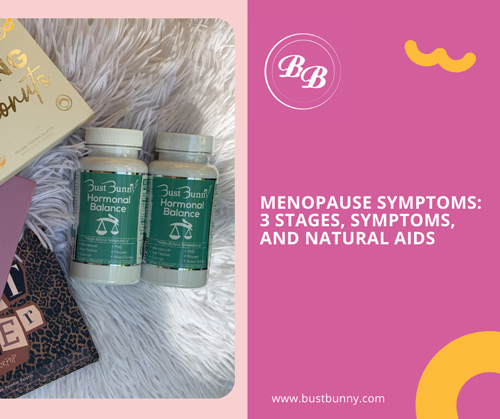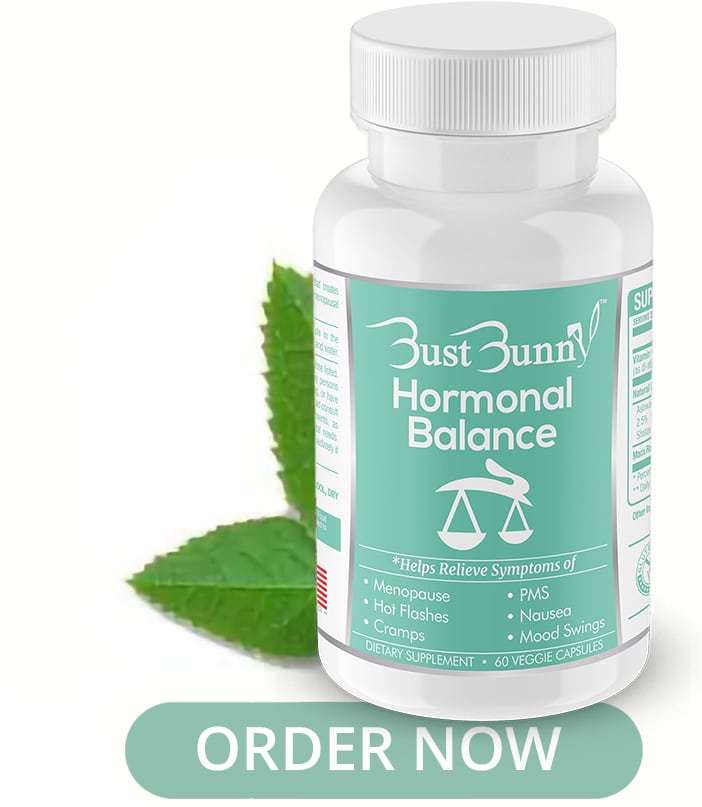At around their late 40s and early 50s, many women start experiencing hormonal changes that lead to menopause. These changes are often accompanied by unpleasant and uncomfortable symptoms such as:
- Hot flashes
- Mood swings
- Anxiety
- Headache
- Fatigue
While menopause can negatively affect your physical and mental health, most women go through it without understanding what’s going on.
Even worse, most women don’t know that there are ways to ease or manage the symptoms—like taking natural hormonal balance supplements.
Let’s take a closer look at what happens during the three stages of menopause, as well as some of the natural remedies that can help alleviate the symptoms.
Stage 1 – Perimenopause: Beginning of Menopause

Perimenopause is the stage that leads up to menopause. This stage is characterized by a disruption in your menstrual cycle such that it becomes unpredictable. For instance, if your normal cycle is 28 days, your period could arrive as early as 21 days or as late as 35 days.
For most women, these perimenopausal changes (such as mood swings, hot flashes, and insomnia) begin in their early to mid-40s, while for some, as early as their mid-30s.
You experience these changes due to hormonal imbalance and irregularities as your functional ovaries diminish and the female reproductive hormones (estrogen and progesterone) production decreases.
This menopausal transition can last a few months, or it can extend up to 10 years for some women. It typically ends when a woman has not had their period for 12 months in a row.
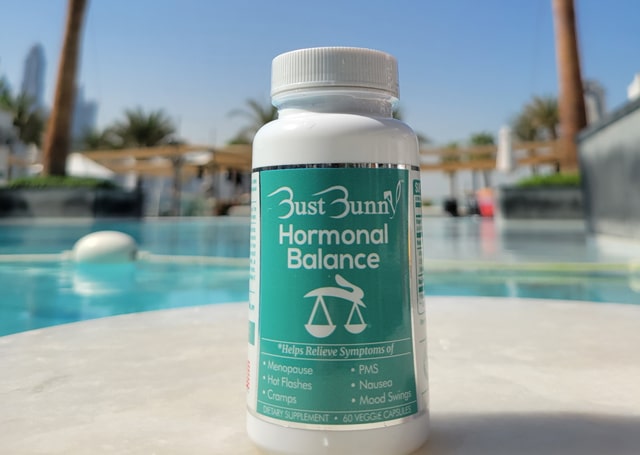
What are the Common Symptoms of Perimenopause?
Perimenopause affects everyone differently. As such, the symptoms you experience may differ from those of your family or friends.
Here are some of the most common symptoms:
- Hot flashes and sleep problems: A hot flash is a sudden increase in body heat followed by sweating and reddening of the skin (around the face, head, and chest). The heated chills can last up to 5 minutes, causing sleep disruptions such as insomnia.
- Mood changes: Perimenopausal women may experience mood swings, irritability, or worse, depression. The mood swings might be triggered by sleep disturbances, hormonal changes, or poor health.
- Vaginal dryness and loss of sex drive: A decrease in estrogen production causes thinning and drying of the vaginal membrane. As a result, the lack of lubrication makes intercourse painful, often leading to little or no sexual desire.
- Worsened Premenstrual Syndrome (PMS): PMS is a mild to moderate form of cramps, bloating, mood swings, irritability, and breast tenderness that typically starts 2-3 weeks before your period. These symptoms worsen during perimenopause due to fluctuating hormone levels.
- Decreased fertility: As ovulation decreases, your chances of becoming pregnant also decrease. However, if you still get your periods during perimenopause, there’s still a possibility that you can conceive.
- Weight gain and loss of bone density: Declining estrogen levels slow the body’s metabolism, which may cause weight gain. It also decreases bone density, increasing your risk of having fragile bones later in life.
Stage 2 – Menopause: End of the Menstrual Cycle
Signs and symptoms of menopause
The menopause stage marks the end of the menstrual cycle, and it happens when your ovaries stop producing eggs.
During this time, your body no longer produces the hormones (estrogen and progesterone) needed for fertility. This means that you won’t be able to get pregnant.
The average age for natural menopause is 51 years, but it can happen anytime between 45 and 55 years. In some instances, it begins as early as the age of 40 and is referred to as premature menopause.
If you have a medical history of cancer or have undergone procedures like hysterectomy (removal of the uterus), you’re likely to experience menopause earlier.
Genetics can also influence the onset of menopause. For instance, if your mother or women in your family hit menopause early, you’re more likely to follow suit.
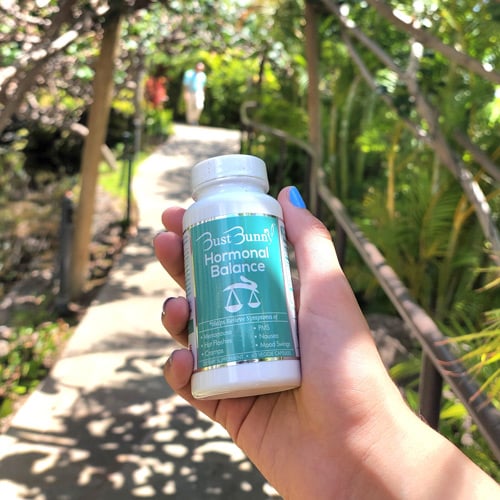
What are the Common Symptoms of Menopause?
At this stage, the symptoms of perimenopause may persist, but they’ll be less frequent and intense.
Some of these symptoms include:
- Trouble sleeping
- Vaginal changes
- Hot flashes
- Night sweats
- Mood swings
Other women may have headaches, hair loss, memory lapses, vaginal bleeding, heart problems, urinary changes, and joint pain. If you experience such symptoms, don’t hesitate to seek medical attention.
Stage 3 – Post-Menopause: After Menopause

This is the period following menopause when a woman’s menstrual periods have permanently stopped. It marks the end of a woman’s reproductive years.
When you reach postmenopause, the symptoms you had throughout menopause may lessen or disappear. However, the menopausal symptoms might linger for up to 10 years or more for some women.
What are the Common Symptoms of Postmenopause?
Due to low levels of the reproductive hormones, postmenopausal women may experience symptoms such as:
- Cognitive problems such as having trouble concentrating or remembering
- Anxiety, depression, irritability, and mood swings
- Vaginal dryness, sexual discomfort and low sex drive
- Increased cholesterol levels and weight gain
- Dry skin and altered skin texture
- Hot flashes and night sweats
- Sleeping disorders like insomnia
Note: If you experience new or unexplained symptoms like vaginal bleeding, seek medical assistance.
Natural Remedies For Menopause Symptoms

Over the years, women have been treating menopausal symptoms through hormone replacement therapy (HRT). Due to the adverse side effects associated with this practice, many are now seeking natural remedies.
Here are some of the best natural remedies you can try:
Take Natural Supplements
Adding herbs and dietary supplements to your meals can help to balance hormones and treat menopausal symptoms.
Below is a table showing some of the herbs, their benefits, and the symptoms they treat:
| Herbs | Benefits | Symptoms Treated |
| Black cohosh | Contains phytoestrogens, which are plant chemical with similar effects to estrogen | Hot flashes Night sweats Mood swings |
| Red clover | Rich in isoflavones (a compound similar to estrogen) normally used as a bio-identical hormone | Bone loss Night sweats Hot flashes |
| Flaxseed | Source of fiber, healthy fat, and antioxidants needed to manage menopausal symptoms | Hot flashes Mood swings Lowers cholesterol |
Other herbs include:
- Wild yam
- Fennel seed
- Fenugreek
- Ginger root
- Maca root
At Bust Bunny, we’ve combined these herbs to create a natural Hormonal Balance supplement that keeps your hormones in check and eases menopausal symptoms.
Here is what one of the customers had to say about using our supplements for treating menopausal symptoms:
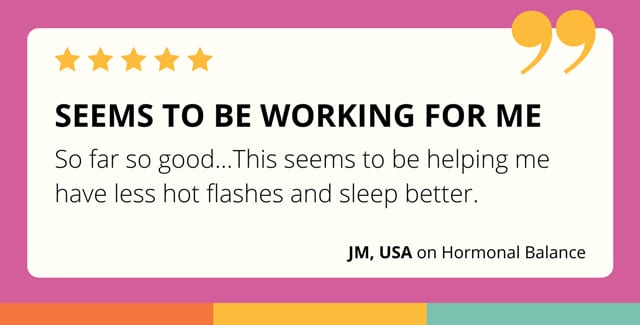
Exercise Regularly
Exercising helps improve mood, reduce stress, boost energy levels, and help you sleep better.
Try incorporating some moderate-intensity activities such as walking, jogging, and swimming into your daily routine.
You can also mix resistance training, cardio, stretching, and balancing to improve your bone and muscle mass.
Maintain a Healthy Diet
Some studies have shown that a healthy diet can help relieve menopausal symptoms. Eating foods high in calcium and vitamin D, such as leafy vegetables, dairy products, and oily fish, can help prevent bone loss.
You should also eat plenty of fruits and vegetables because they contain vitamins, minerals, and antioxidants that may improve mood and relieve symptoms such as hot flashes. These are also low in calories, which is necessary for weight maintenance.
Ensure you drink a lot of water (8 to 12 glasses a day) to help with bloating, weight gain, and vaginal dryness.
It’s also important to avoid processed foods or refined sugar because these trigger menopausal symptoms such as mood swings, insomnia, hot flashes, and night sweats.
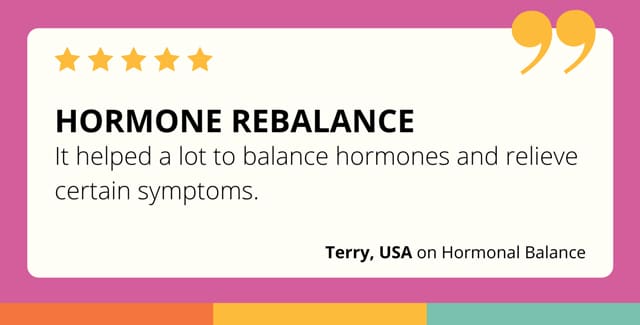
Avoid Stressful Situations
Stress can trigger menopausal symptoms such as anxiety, mood swings, and insomnia. Reduce your stress levels by taking some time for yourself every day.
Try yoga, meditation, aromatherapy massages, or spending some quality time with your loved ones.
Manage Your Menopausal Symptoms Naturally
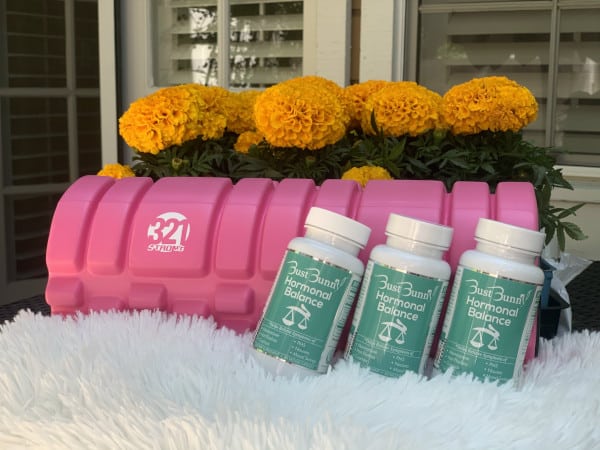
According to a survey, 50.5% of women have used natural remedies to alleviate menopausal symptoms. Many of these women turn to natural aids because they’re frustrated by the scarcity of effective treatment.
For this reason, Bust Bunny has created an all-in-one solution that works for all women—Bust Bunny’s Hormonal Balance supplement. This natural supplement is packed with herbs and vitamins necessary for combating menopausal symptoms. Women from around the world love the Bust Bunny hormonal balance supplements because they are affordable, suitable for all women, and can be taken with most medications.
Share on Instagram:
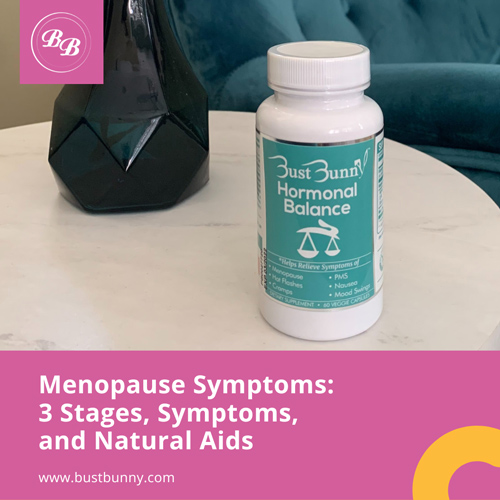
Share on Facebook:
